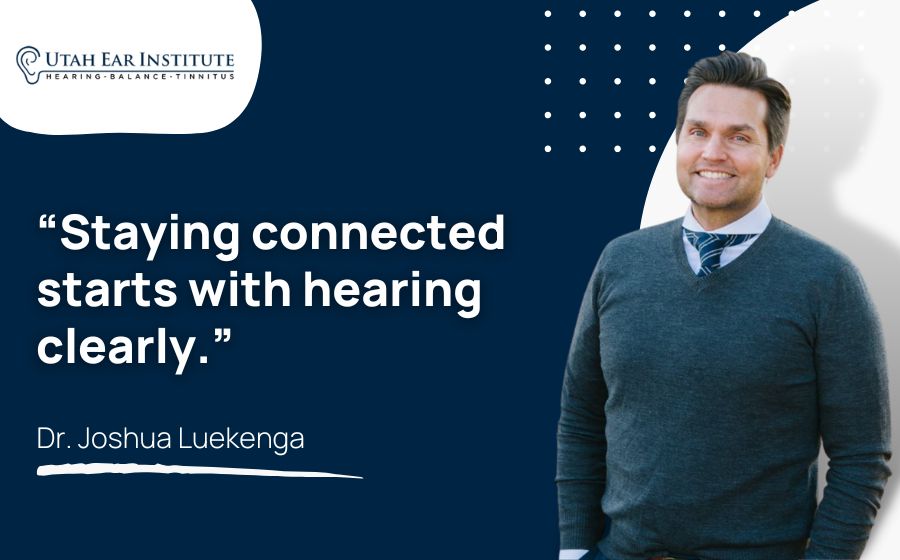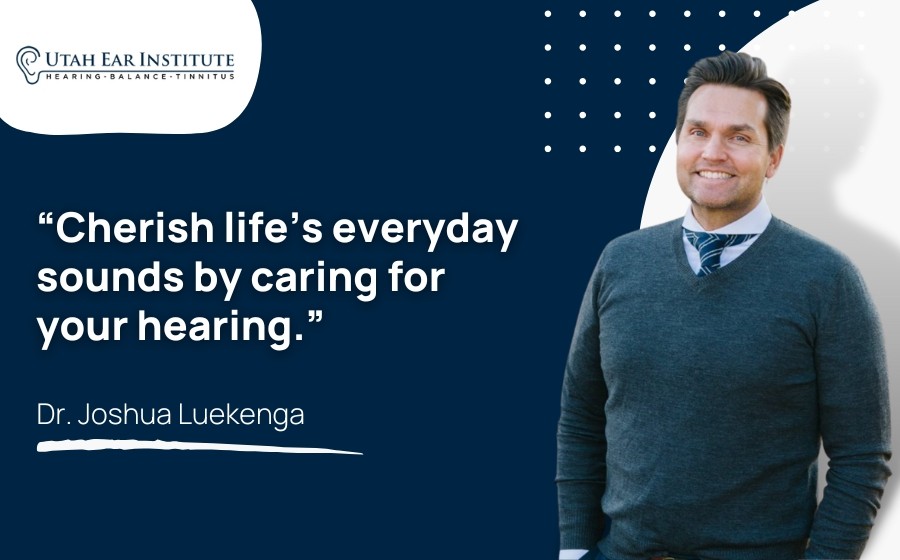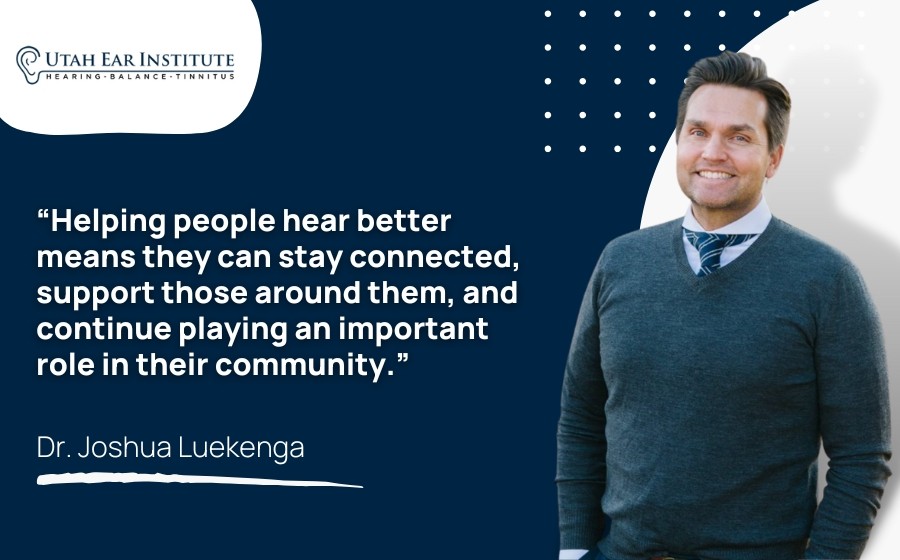Presbycusis Counseling and Treatment
Age-related hearing loss, or presbycusis, is one of the most common causes of hearing loss in adults worldwide, accounting for up to 80% of all cases of hearing loss and affecting more than half of the adult population over age 75, most adults over the age of 80, and nearly all adults who are 90 years and above.



Because presbycusis comes on at a very slow pace in most individuals, most do not address the issue until it becomes a struggle to understand conversations and communicate with family, friends, and co-workers.
One of the keys to enjoying better hearing for a longer period of time is to address presbycusis as early as possible.
In order to help those at risk of developing presbycusis get a head start on better hearing, Utah Ear Institute has presbycusis counseling centers in our Bountiful, Tooele, Park City, and West Valley City hearing and balance clinics.

Because presbycusis comes on at a very slow pace in most individuals, most do not address the issue until it becomes a struggle to understand conversations and communicate with family, friends, and co-workers.
One of the keys to enjoying better hearing for a longer period of time is to address presbycusis as early as possible.
In order to help those at risk of developing presbycusis get a head start on better hearing, Utah Ear Institute has presbycusis counseling centers in our Bountiful, Tooele, Park City, and West Valley City hearing and balance clinics.

Because presbycusis comes on at a very slow pace in most individuals, most do not address the issue until it becomes a struggle to understand conversations and communicate with family, friends, and co-workers.
One of the keys to enjoying better hearing for a longer period of time is to address presbycusis as early as possible.
In order to help those at risk of developing presbycusis get a head start on better hearing, Utah Ear Institute has presbycusis counseling centers in our Bountiful, Tooele, Park City, and West Valley City hearing and balance clinics.
Presbycusis and Its Risk Factors
The three main types of presbycusis include: sensory presbycusis (loss of hair cells and a high-frequency hearing deficit), metabolic (loss of stria vascularis and a low-frequency hearing deficit), and neural (loss of ganglion cells and a variable pattern of hearing loss).
The risk factors connected to the onset and severity of presbycusis can include:
Genetic predisposition
Low socioeconomic status
Exposure to loud noise (exposure during youth can hasten the progression despite the cessation of noise exposure)
Exposure to ototoxins (e.g., aminoglycosides, chemotherapeutic agents, heavy metals)
Hormonal conditions (e.g., aldosterone, thyroid hormones, estrogen)
Otologic infections
Smoking
Hypertension
Diabetes
Vascular diseases
Immunologic disorders

Presbycusis and Its Risk Factors
The three main types of presbycusis include: sensory presbycusis (loss of hair cells and a high-frequency hearing deficit), metabolic (loss of stria vascularis and a low-frequency hearing deficit), and neural (loss of ganglion cells and a variable pattern of hearing loss).
The risk factors connected to the onset and severity of presbycusis can include:
Genetic predisposition
Low socioeconomic status
Exposure to loud noise (exposure during youth can hasten the progression despite the cessation of noise exposure)
Exposure to ototoxins (e.g., aminoglycosides, chemotherapeutic agents, heavy metals)
Hormonal conditions (e.g., aldosterone, thyroid hormones, estrogen)
Otologic infections
Smoking
Hypertension
Diabetes
Vascular diseases
Immunologic disorders

Presbycusis and Its Risk Factors
The three main types of presbycusis include: sensory presbycusis (loss of hair cells and a high-frequency hearing deficit), metabolic (loss of stria vascularis and a low-frequency hearing deficit), and neural (loss of ganglion cells and a variable pattern of hearing loss).
The risk factors connected to the onset and severity of presbycusis can include:
Genetic predisposition
Low socioeconomic status
Exposure to loud noise (exposure during youth can hasten the progression despite the cessation of noise exposure)
Exposure to ototoxins (e.g., aminoglycosides, chemotherapeutic agents, heavy metals)
Hormonal conditions (e.g., aldosterone, thyroid hormones, estrogen)
Otologic infections
Smoking
Hypertension
Diabetes
Vascular diseases
Immunologic disorders


Presbycusis Signs and Symptoms
The most common signs and symptoms of age-related hearing loss can include
Mumbled speech or muted sounds
Difficulty distinguishing between “s” and “th” sounds
Difficulty understanding conversations, especially when there is background noise
Able to understand men’s voices easier than those of women and children
Some sounds seem overly loud and annoying (sound sensitivity or hypercusis)
Tinnitus (ringing in the ears) in one or both ears
Some symptoms of age-related hearing loss can look like other medical issues, such as cognitive decline, dementia, dizziness, vertigo, and balance disorders as well as mental health issues like depression and anxiety.

Presbycusis Signs and Symptoms
The most common signs and symptoms of age-related hearing loss can include
Mumbled speech or muted sounds
Difficulty distinguishing between “s” and “th” sounds
Difficulty understanding conversations, especially when there is background noise
Able to understand men’s voices easier than those of women and children
Some sounds seem overly loud and annoying (sound sensitivity or hypercusis)
Tinnitus (ringing in the ears) in one or both ears
Some symptoms of age-related hearing loss can look like other medical issues, such as cognitive decline, dementia, dizziness, vertigo, and balance disorders as well as mental health issues like depression and anxiety.

Presbycusis Signs and Symptoms
The most common signs and symptoms of age-related hearing loss can include
Mumbled speech or muted sounds
Difficulty distinguishing between “s” and “th” sounds
Difficulty understanding conversations, especially when there is background noise
Able to understand men’s voices easier than those of women and children
Some sounds seem overly loud and annoying (sound sensitivity or hypercusis)
Tinnitus (ringing in the ears) in one or both ears
Some symptoms of age-related hearing loss can look like other medical issues, such as cognitive decline, dementia, dizziness, vertigo, and balance disorders as well as mental health issues like depression and anxiety.
Presbycusis Evaluation, Counseling, and Treatment
Counseling and treatment are facilitated by the identification of hearing loss, which is often mistaken for cognitive impairment.
Evaluating presbycusis involves a comprehensive hearing assessment to determine the type and severity of hearing loss associated with the condition. The assessment includes a physical examination of the ears, which is used to rule out blockages from cerumen, growths, tumors (such as acoustic neuroma), inflammation, or foreign objects, as well as instrument testing to measure the type and severity of hearing loss.
Because age-related hearing loss can begin to develop as early as age 44, our audiologists recommend annual hearing tests starting at 50 years of age in order to measure the progression and begin counseling and treatment before the condition has a more significant impact on your hearing.
Directed treatment to prevent or reverse effects of presbycusis is not available. However, multiple counseling and treatment options can compensate for hearing loss and improve daily function and well-being, including:
Prevention Counseling
Aural Rehabilitation
Hearing Aids & Other Technology
Presbycusis Evaluation, Counseling, and Treatment
Counseling and treatment are facilitated by the identification of hearing loss, which is often mistaken for cognitive impairment.
Evaluating presbycusis involves a comprehensive hearing assessment to determine the type and severity of hearing loss associated with the condition. The assessment includes a physical examination of the ears, which is used to rule out blockages from cerumen, growths, tumors (such as acoustic neuroma), inflammation, or foreign objects, as well as instrument testing to measure the type and severity of hearing loss.
Because age-related hearing loss can begin to develop as early as age 44, our audiologists recommend annual hearing tests starting at 50 years of age in order to measure the progression and begin counseling and treatment before the condition has a more significant impact on your hearing.
Directed treatment to prevent or reverse effects of presbycusis is not available. However, multiple counseling and treatment options can compensate for hearing loss and improve daily function and well-being, including:
Prevention Counseling
Aural Rehabilitation
Hearing Aids & Other Technology
Presbycusis Evaluation, Counseling, and Treatment
Counseling and treatment are facilitated by the identification of hearing loss, which is often mistaken for cognitive impairment.
Evaluating presbycusis involves a comprehensive hearing assessment to determine the type and severity of hearing loss associated with the condition. The assessment includes a physical examination of the ears, which is used to rule out blockages from cerumen, growths, tumors (such as acoustic neuroma), inflammation, or foreign objects, as well as instrument testing to measure the type and severity of hearing loss.
Because age-related hearing loss can begin to develop as early as age 44, our audiologists recommend annual hearing tests starting at 50 years of age in order to measure the progression and begin counseling and treatment before the condition has a more significant impact on your hearing.
Directed treatment to prevent or reverse effects of presbycusis is not available. However, multiple counseling and treatment options can compensate for hearing loss and improve daily function and well-being, including:
Prevention Counseling
Aural Rehabilitation
Hearing Aids & Other Technology
Frequently Asked Questions about Presbycusis
If you have any other questions, please email us.
What causes presbycusis?
Can presbycusis be treated?
Can presbycusis be unilateral?
How is presbycusis diagnosed?
How does presbycusis affect the ear?
How does presbycusis affect daily life?
Frequently Asked Questions about Presbycusis
If you have any other questions, please email us.
What causes presbycusis?
Can presbycusis be treated?
Can presbycusis be unilateral?
How is presbycusis diagnosed?
How does presbycusis affect the ear?
How does presbycusis affect daily life?
Frequently Asked Questions about Presbycusis
If you have any other questions, please email us.
What causes presbycusis?
Can presbycusis be treated?
Can presbycusis be unilateral?
How is presbycusis diagnosed?
How does presbycusis affect the ear?
How does presbycusis affect daily life?
What Our Delighted Patients Say
Hear from our delighted patients about their experience at Utah Ear Institute

“Give them a try.”
Steve H.

“You won’t regret going.”
Alicia F.

“I can understand better.”
Kim H.
What Our Delighted Patients Say
Hear from our delighted patients about their experience at Utah Ear Institute

“Give them a try.”
Steve H.

“You won’t regret going.”
Alicia F.

“I can understand better.”
Kim H.
What Our Delighted Patients Say
Hear from our delighted patients about their experience at Utah Ear Institute

“Give them a try.”
Steve H.

“You won’t regret going.”
Alicia F.

“I can understand better.”
Kim H.
Schedule a Hearing Assessment
Before your condition deteriorates further, leading to additional negative physical and mental conditions, seek the help of our licensed professional audiologists at Utah Ear Institute for counseling and treatment for presbycusis.
Just submit the adjacent form so a member of our team can give you a call and help you start the process by scheduling a hearing assessment.

Schedule a Hearing Assessment
Before your condition deteriorates further, leading to additional negative physical and mental conditions, seek the help of our licensed professional audiologists at Utah Ear Institute for counseling and treatment for presbycusis.
Just submit the adjacent form so a member of our team can give you a call and help you start the process by scheduling a hearing assessment.

Schedule a Hearing Assessment
Before your condition deteriorates further, leading to additional negative physical and mental conditions, seek the help of our licensed professional audiologists at Utah Ear Institute for counseling and treatment for presbycusis.
Just submit the adjacent form so a member of our team can give you a call and help you start the process by scheduling a hearing assessment.

Ask Dr. Josh
Our latest hearing health articles, resources & blogs

How Hearing Aids Helped Improve Communication and Brain Health: Glen’s Story
Early hearing support can protect your brain and improve daily conversations.

How Modern Hearing Aids Helped Protect the Sounds Judith Loves
Protect your hearing and enjoy the sounds you love every day.

Hear for the Holidays 2025 – Meet This Year’s Winner!
Meet Todd, our 2025 Hear for the Holidays winner.
Ask Dr. Josh
Our latest hearing health articles, resources & blogs

How Hearing Aids Helped Improve Communication and Brain Health: Glen’s Story
Early hearing support can protect your brain and improve daily conversations.

How Modern Hearing Aids Helped Protect the Sounds Judith Loves
Protect your hearing and enjoy the sounds you love every day.

Hear for the Holidays 2025 – Meet This Year’s Winner!
Meet Todd, our 2025 Hear for the Holidays winner.
Ask Dr. Josh
Our latest hearing health articles, resources & blogs

How Hearing Aids Helped Improve Communication and Brain Health: Glen’s Story
Early hearing support can protect your brain and improve daily conversations.

How Modern Hearing Aids Helped Protect the Sounds Judith Loves
Protect your hearing and enjoy the sounds you love every day.

Hear for the Holidays 2025 – Meet This Year’s Winner!
Meet Todd, our 2025 Hear for the Holidays winner.